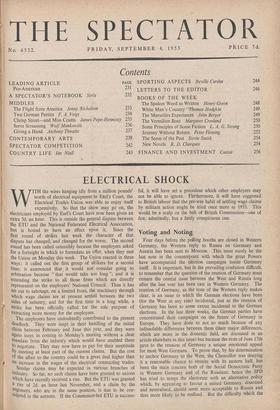ELECTRICAL SHOCK
WITH the wires hanging idly from a million pounds' worth-of electrical equipment in Earl's Court, the Electrical Trades Union was able to enjoy itself expensively. So that the show may go on, the electricians employed by Earl's Court have now been given an extra 3d. an hour. This is outside the general dispute between the ETU and the National Federated Electrical Association, but is bound to have an effect upon it. Since the first round of strikes last week the character of that dispute has changed, and changed for the worse. The second round has been called ostensibly because the employers asked for a fortnight in which to formulate an offer, when they met the Union on Monday this week. The Union reacted in three ways: it called out the first group of strikers for a second time; it announced that, it would not consider going to arbitration because " that would take too long "; and it is extending the strike to all those firms which are directly represented on the employers' National Council. Thus it has set out to sabotage, on a limited front, the machinery through which wage claims are at present settled between the two sides of industry, and for the first time in a long while, a strike has been officially called for the sole purpose of extracting more money for the employees.
The employers have undoubtedly contributed to the present deadlock. They were inept in their handling of the initial claim between February and June this year, and they were again inept in coming to Monday's meeting without a clear Mandate from the industry which would have enabled them to negotiate. They may now have to pay for their ineptitude by meeting at least part of the current claims. But the cost of the affair to the country could be a great deal higher than an increase in the wages of the electrical contracting trades.
Similar claims may be expected in various branches of industry. So far, no such claims have been granted to unions Which have recently received a rise. But the ETU was granted a rise of 2d. an hour last November, and a claim by the engineers, who are in the same position, is due to be con- sickered in the autumn. If the Communist-led ETU is success- ful, it will have set a precedent which other employers may not .be able to ignore. Furthermore, it will have suggested to British labour that the pre-war habit of settling wage claims by militant action might be tried once more in 1953. This would be a scalp on the belt of British Communism—one of few, admittedly, but a fairly conspicuous one.


































 Previous page
Previous page